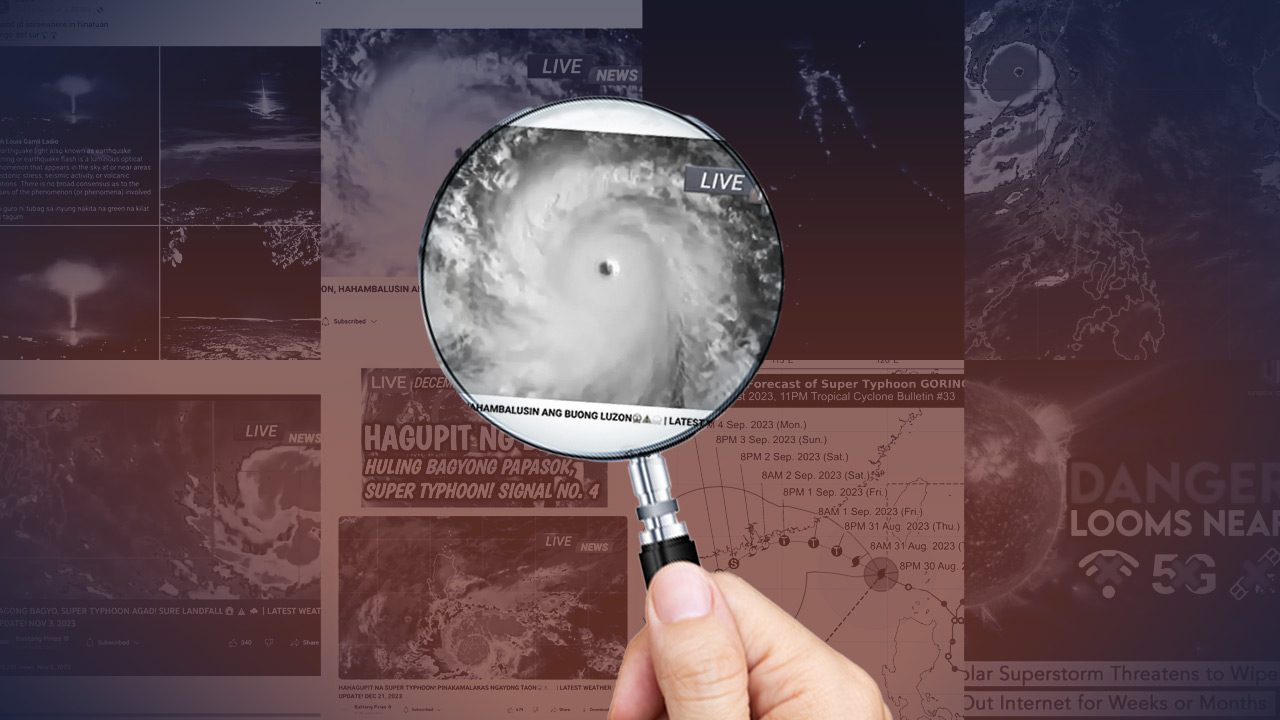SUMMARY
This is AI generated summarization, which may have errors. For context, always refer to the full article.

MANILA, Philippines – In 2023, the Philippines experienced several super typhoons, earthquakes, and volcanic activity that affected the lives of thousands of Filipinos.
This year, several social media users and pages made dubious claims about these disasters, sowing unneeded panic and paranoia through inaccurate and exaggerated information.
Rappler fact-checked 31 such dubious claims this year. Some of these claims spread while the Mayon Volcano unrest or disasters like Super Typhoon Goring (Saola) were unfolding.
Rappler has also fact-checked claims about disasters that were made to look like they originated from legitimate sources but in reality were fabricated.
Lies about weather predictions
Half of all fact checks on disasters that Rappler published this year were claims about false weather predictions.
These include false claims like alleged existence of super typhoons inside the Philippine Area of Responsibility, the landfall of these cyclones, and inaccurate tropical cyclone wind signals.
Fact checks on typhoon related false claims began to increase in June at the time of the start of the rainy season. From August to December, the majority of disaster related fact checks were about typhoons.
False earthquake, volcanic eruption predictions
Rappler also fact-checked several false claims about earthquake and volcanic eruption predictions in 2023.
Several Facebook users posted predictions on when and where an earthquake or a volcanic eruption would exactly happen.
There are also claims about wrong alert level status of volcanoes like Mayon at the height of its unrest.
Experts warn public
Experts from both the Philippine Atmospheric, Geophysical, and Astronomical Services Administration (PAGASA) and the Philippine Institute of Volcanology and Seismology (Phivolcs) warn the public against believing posts containing dubious claims.
In a story on November 15 by The Freeman hosted in Philstar.com, PAGASA cautioned the public against believing posts about an alleged typhoon that was supposed to hit Cebu.
In The Freeman article, PAGASA-Visayas Regional Services Division weather specialist Jhomer Eclarino urged everyone to only check PAGASA’s official Facebook page for legitimate weather updates.
Addressing disinformation that is focused on earthquakes, Phivolcs Director Dr. Teresito Bacolcol told Rappler in a statement that the public shouldn’t believe posts telling when and where an earthquake would exactly occur. (READ: EXPLAINER: Is it possible to predict earthquakes?)
“Earthquakes happen when there is a sudden release of energy caused mostly by the movement of tectonic plates (broken pieces of the outermost layer of the earth called lithosphere) and the movement of gas, magma, and other fluids underneath a volcano. These movements happen without warning and hence, it is impossible to predict where and when earthquakes will happen exactly,” Bacolcol said.
The Phivolcs director also said that although a volcano might “show signs” prior to a major eruption such as volcanic earthquakes, volcanic gas emissions, steaming, and ground deformation, among others, and issues volcano information both daily and during heightened volcanic activity.
However, Bacolcol reminded the public to always verify posts that they see in social media before believing in them.
“The public is encouraged to thoroughly understand and verify the information with the authorities. They should avoid sharing and believing messages from unconfirmed and unreliable sources,” Bacolcol told Rappler.
Bacolcol also encouraged the public to “follow and share information” from the official website, Facebook, Twitter, and YouTube accounts of Phivolcs as well as the official dashboard of the National Disaster Risk Reduction and Management Council. – Rappler.com
Add a comment
How does this make you feel?





![[DECODED] The Philippines and Brazil have a lot in common. Online toxicity is one.](https://www.rappler.com/tachyon/2024/07/misogyny-tech-carousel-revised-decoded-july-2024.jpg?resize=257%2C257&crop_strategy=attention)




There are no comments yet. Add your comment to start the conversation.